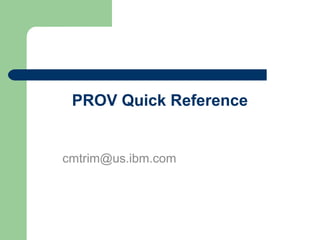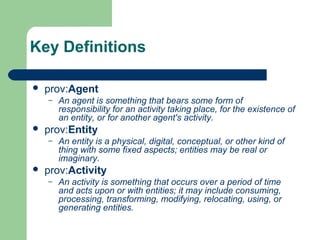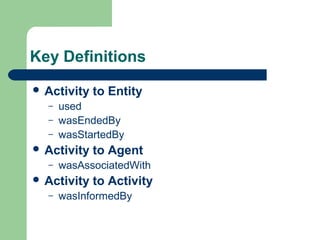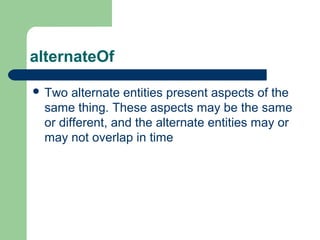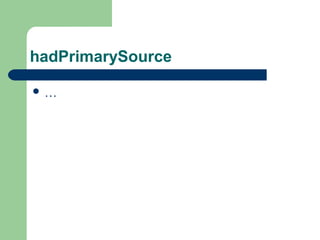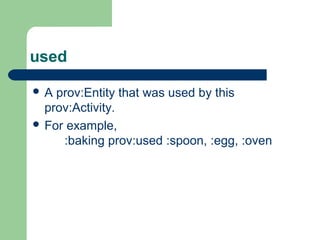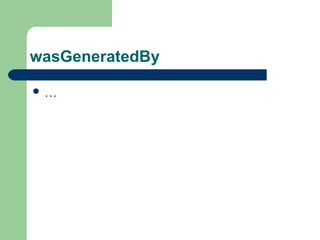PROV Overview
- 2. ïŽ prov:Agent â An agent is something that bears some form of responsibility for an activity taking place, for the existence of an entity, or for another agent's activity. ïŽ prov:Entity â An entity is a physical, digital, conceptual, or other kind of thing with some fixed aspects; entities may be real or imaginary. ïŽ prov:Activity â An activity is something that occurs over a period of time and acts upon or with entities; it may include consuming, processing, transforming, modifying, relocating, using, or generating entities. Key Definitions
- 3. Key Definitions ïŽ Entity to Entity â wasInfluencedBy (broad relation) â wasDerivedFrom ïŽ hadPrimarySource ïŽ wasQuotedFrom ïŽ wasRevisionOf â alternateOf ïŽ specializationOf ïŽ Entity to Agent â wasInfluencedBy (broad relation) â wasAttributedTo ïŽ Entity to Activity â wasInfluencedBy (broad relation) â wasGeneratedBy â wasInvalidatedBy
- 4. Key Definitions ïŽ Agent to Entity â (none) ïŽ Agent to Agent â actedOnBehalfOf ïŽ Agent to Activity â (none)
- 5. Key Definitions ïŽ Activity to Entity â used â wasEndedBy â wasStartedBy ïŽ Activity to Agent â wasAssociatedWith ïŽ Activity to Activity â wasInformedBy
- 6. actedOnBehalfOf ïŽ An object property to express the accountability of an agent towards another agent. The subordinate agent acted on behalf of the responsible agent in an actual activity. Agent to Agent
- 7. alternateOf ïŽ Two alternate entities present aspects of the same thing. These aspects may be the same or different, and the alternate entities may or may not overlap in time Entity to Entity
- 8. hadPrimarySource ïŽ A primary source for a topic refers to something produced by some agent with direct experience and knowledge about the topic, at the time of the topic's study, without benefit from hindsight. ïŽ Because of the directness of primary sources, they 'speak for themselves' in ways that cannot be captured through the filter of secondary sources. As such, it is important for secondary sources to reference those primary sources from which they were derived, so that their reliability can be investigated. ïŽ A primary source relation is a particular case of derivation of secondary materials from their primary sources. It is recognized that the determination of primary sources can be up to interpretation, and should be done according to conventions accepted within the application's domain. Entity to Entity
- 9. used ïŽ A prov:Entity that was used by this prov:Activity. ïŽ For example, :baking prov:used :spoon, :egg, :oven Activity to Entity
- 10. wasAssociatedWith ïŽ An prov:Agent that had some (unspecified) responsibility for the occurrence of this prov:Activity Activity to Agent
- 11. wasAttributedTo ïŽ Attribution is the ascribing of an entity to an agent Entity to Agent
- 12. wasDerivedFrom ïŽ A derivation is a transformation of an entity into another, an update of an entity resulting in a new one, or the construction of a new entity based on a pre-existing entity. Entity to Entity
- 13. wasEndedBy ïŽ End is when an activity is deemed to have ended. An end may refer to an entity, known as trigger, that terminated the activity Activity to Entity
- 14. wasGeneratedBy ïŽ Generation is the completion of production of a new entity by an activity. This entity did not exist before generation and becomes available for usage after this generation. Entity to Activity
- 15. wasInfluencedBy ïŽ Because prov:wasInfluencedBy is a broad relation, its more specific subproperties (e.g. prov:wasInformedBy, prov:actedOnBehalfOf, prov:wasEndedBy, etc.) should be used when applicable. (Activity, Agent, Entity)
- 16. wasInformedBy ïŽ An activity a2 is dependent on or informed by another activity a1, by way of some unspecified entity that is generated by a1 and used by a2 Activity to Activity
- 17. wasInvalidatedBy ïŽ Invalidation is the start of the destruction, cessation, or expiry of an existing entity by an activity. The entity is no longer available for use (or further invalidation) after invalidation. Any generation or usage of an entity precedes its invalidation. Entity to Activity
- 18. wasQuotedFrom ïŽ An entity is derived from an original entity by copying, or 'quoting', some or all of it Entity to Entity
- 19. wasRevisionOf ïŽ A revision is a derivation that revises an entity into a revised version Entity to Entity
- 20. wasStartedBy ïŽ Start is when an activity is deemed to have started. A start may refer to an entity, known as trigger, that initiated the activity. Activity to Entity
Editor's Notes
- The more specific subproperties of prov:wasDerivedFrom (i.e., prov:wasQuotedFrom, prov:wasRevisionOf, prov:hadPrimarySource) should be used when applicable.
- The sub-properties of prov:wasInfluencedBy can be elaborated in more detail using the Qualification Pattern. For example, the binary relation :baking prov:used :spoon can be qualified by asserting :baking prov:qualifiedUsage [ a prov:Usage; prov:entity :spoon; prov:atLocation :kitchen ] . Subproperties of prov:wasInfluencedBy may also be asserted directly without being qualified. prov:wasInfluencedBy should not be used without also using one of its subproperties.

